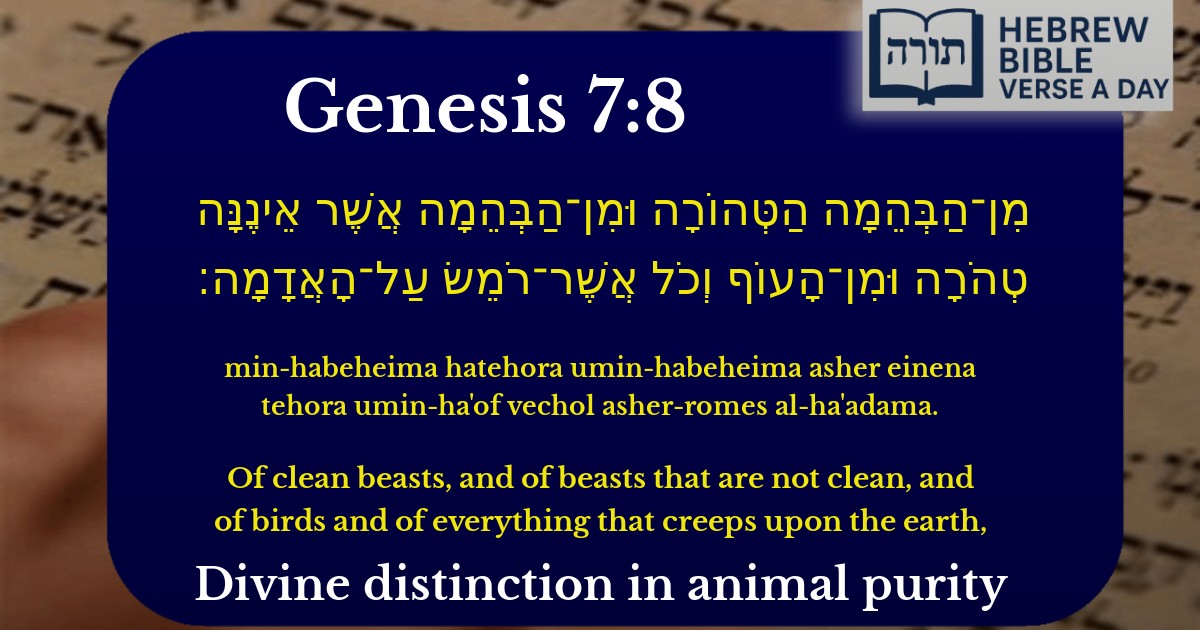Frequently Asked Questions
Q: What does Genesis 7:8 mean by 'clean beasts' and 'beasts that are not clean'?
A: In Genesis 7:8, 'clean beasts' (בְּהֵמָה הַטְּהוֹרָה) refers to animals that are kosher and permitted for consumption or sacrifice according to Jewish law, while 'beasts that are not clean' (בְּהֵמָה אֲשֶׁר אֵינֶנָּה טְהֹרָה) are non-kosher animals. Rashi explains that Noah was commanded to take more clean animals (seven pairs) than non-clean animals (one pair) because they would later be used for sacrifices (Genesis 7:2).
Q: Why does Genesis 7:8 mention birds and creeping creatures along with animals?
A: Genesis 7:8 mentions birds and creeping creatures to show that every living creature was included in Noah's Ark to repopulate the earth after the flood. The Talmud (Sanhedrin 108b) discusses how all species were preserved, emphasizing G-d's care for all creation. The clean birds were also needed for future sacrifices, as explained by Ramban (Nachmanides).
Q: How do we know which animals are 'clean' or 'unclean' in Genesis 7:8?
A: The Torah later defines which animals are clean (kosher) and unclean in Leviticus 11 and Deuteronomy 14. For example, clean land animals must have split hooves and chew their cud (like cows and sheep). Rashi notes that Noah already knew these laws even before they were formally given at Mount Sinai, as G-d instructed him about the differences (Genesis 7:2).
Q: What lesson can we learn from Genesis 7:8 about treating animals?
A: Genesis 7:8 teaches the importance of preserving all life, as Noah was commanded to save every species. The Midrash (Bereshit Rabbah 28:8) highlights that even creatures we might consider insignificant ('everything that creeps upon the earth') have a purpose in G-d's creation. This reminds us to treat all living beings with respect.
Q: Does Genesis 7:8 have any relevance to kosher laws today?
A: Yes, Genesis 7:8 introduces the concept of clean (kosher) and unclean animals, which later becomes the foundation for Jewish dietary laws (kashrut). Rambam (Hilchot Ma'achalot Asurot) explains that these distinctions teach holiness and self-discipline, separating the Jewish people in their service to G-d.


Context in the Torah
This verse appears in Bereishit (Genesis) 7:8, describing the animals that Noach brought into the ark before the flood. The Torah distinguishes between beheimah tehorah (clean animals) and beheimah asher einena tehorah (animals that are not clean), as well as birds and creeping creatures.
Rashi's Explanation
Rashi (Bereishit 7:8) notes that the term tehorah (clean) refers to animals that would later be permitted as kosher sacrifices and food under the laws given to Bnei Yisrael. He explains that Noach was already familiar with these distinctions, as they were known from the time of Adam HaRishon (see Rashi on Bereishit 7:2).
Rambam's Perspective
In Moreh Nevuchim (3:48), Rambam discusses the deeper wisdom behind the division of animals into clean and unclean categories. He suggests that the Torah's dietary laws promote spiritual refinement by distancing people from certain animal behaviors and characteristics that are spiritually detrimental.
Midrashic Insights
Halachic Implications
The Tur and Shulchan Aruch (Yoreh De'ah 79-80) derive from this verse that the concept of kosher animals predates Matan Torah. The seven Noachide laws include prohibitions against eating limbs from live animals, but the full system of kashrut was given specifically to Bnei Yisrael at Sinai.
Symbolic Interpretation
The Kli Yakar (Bereishit 7:8) suggests that the inclusion of all creatures in the ark represents Hashem's mercy even toward the impure, giving them an opportunity for teshuvah through the experience of the flood. The distinction between pure and impure animals reflects the dual nature of creation, containing both holy and unholy elements.